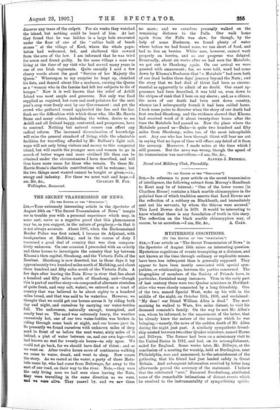THE SECRET TRANSMISSION OF NEWS.
[To THE EDITOR OP THE "SPECTATOR."] Stn,—Your extremely interesting article in the Spectator of August 16th on " The Secret Transmission of News " tempts me to trouble you with a personal experience which may, in some sort, serve as a negative proof that this phenomenon may be, as you suggest, in the nature of prophecy,—in that it is not always accurate. About 1885, when the Bechrranaland Border Police was first raised, I became its Adjutant, with headquarters at Mafeking ; and in the course of duty I traversed a good deal of country that was then compara- tively unknown. On one occasion I proceeded with an orderly and three horses to investigate the country that lay between Khama's then capital, Shoshong, and the Victoria Falls of the Zambesi. Shoshong is now deserted, but in those days it lay approximately two hundred miles north of Mafeking, and about three hundred and fifty miles south of the Victoria Falls. A few days after leaving the Nata River (a river that lies about a hundred and fifty miles north of Shoshong, and—though this is part of another story—is composed of alternate stretches of quite fresh, and very salt, water), we entered on a tract of country that was believed to be about eighty to a hundred miles broad, and that was said to be waterless. However, we thought that we could get our horses across it by riding both day and night, and ourselves by carrying our water-bottles full. The unforeseen, naturally enough, transpired, and nearly beat us. The sand was extremely heavy, the weather excessively hot, one of our two water-bottles was broken in riding through some bush at night, and our horses gave in. So presently we found ourselves with unknown miles of deep sand in front of us before the next water, sixty miles of it behind, a pint of water between us, and our own legs—that had known no rest for twenty-six hours—to rely upon. We could not go back, for we should have died of thirst ; and so we went on. After twelve hours more of continuous walking we came to water, drank, and went to sleep. Now comes the story. As we rested at the water, a party of three Mata- bele came by, who had come from Buluwayo, far away to the east of our road, on their way to the river. Note,—they were the only living men we had seen since leaving the Nato., they were travelling in the same direction as we were, attd we were alive. They passed by, and we saw them no more; and we ourselves presently walked on the remaining distance to the Falls. Our walk home again from the Falls was slow, for though, by the help of some Bushmen, we found plenty of water where before we had found none, we ran short of food, and had to live on berries. White men, however, cannot work properly on berries, and so our progress was delayed. Eventually, about six weeks after we had seen the Matabele, we got out to Shoshong again. On our arrival we were greeted with amazement; for, we were told, word had come down by Khama's Bushmen that " a Matabele " had seen both of our dead bodies three days' journey beyond the Nata; and the story that we had died of thirst had been so circum- stantial as apparently to admit of no doubt. Our exact ap- pearance had been described, it was told us, even down to the stripes of rank that I bore on my sleeve ; and, as a climax, the news of our death had been sent down country, whence (as I subsequently found) it had been cabled home. I took some pains to discover when the story of our death had first reached Shoshong, and the evidence showed that Khama had received word of it about twenty-four hours after the time the Matabele had passed us. Now the place where the Matabele passed us—Daka—is quite two hundred and fifty miles from Shoshong; miles, too, of the most inhospitable sort. Any one who has been through thirst will bear me out in saying that no lapse of time will efface any detail of it from the memory. Moreover, I made notes at the time which I still possess. But the news was wrong, though the speed of its transmission was marvellous.—I am, Sir, &c.,






































 Previous page
Previous page